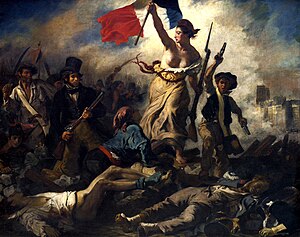Либерализм
Харагдаса

Либерализм гээшэ эрхэ сүлөө болон адли тэгшэ эрхын үзэл дээрэ тулгуурилһан улас түрын гүн ухаан юм.[1][2][3] Хэрбээ һунгагдаһан (классик) либерализм эрхэ сүлөөгэй илгаруулбал, ниигэмэй либерализм (социал-либерализм) адли тэгшэ байдалай шухалые сэгнэнэ.[4] Либералнууд элдэб түрэлэй үзэлтэйшье һаа, либералнууд юрэдөө үгэ хэлэхэ, хэблэн ниитэлхэ эрхэ сүлөө, шажанай эрхэ сүлөө, сүлөөтэ заха зээли, эрхэтэнэй эрхэ, арадшалһан ниигэм, эрхэтэнэй засагай газар, эрэ эмэ тэгшэ байдал ба олон уласай хамтын ажаллалгые дэмжэнэ.[5][6][7][8][9][10][11]
Зүүлтэ
[Заһаха | үндэһэн бэшэгые заһабарилха]- ↑ "liberalism In general, the belief that it is the aim of politics to preserve individual rights and to maximize freedom of choice."
- ↑ "political rationalism, hostility to autocracy, cultural distaste for conservatism and for tradition in general, tolerance, and ... individualism."
- ↑ "With a nod to Robert Trivers' definition of altruistic behavior (Trivers 1971, p. 35), Satoshi Kanazawa defines liberalism (as opposed to conservatism) as "the genuine concern for the welfare of genetically unrelated others and the willingness to contribute larger proportions of private resources for the welfare of such others" (Kanazawa 2010, p. 38).
- ↑ Young 2002, p. 39.
- ↑ The Liberal Agenda for the 21st Century. the original on 7 February 2011 үдэрһөө архивлагдаһан. 20 March 2015 үдэртэ хандаһан.
- ↑ Nader Hashemi (11 March 2009). Islam, Secularism, and Liberal Democracy: Toward a Democratic Theory for Muslim Societies. Oxford University Press. ISBN 978-0-19-971751-4. “Liberal democracy requires a form of secularism to sustain itself”
- ↑ Kathleen G. Donohue (19 December 2003). Freedom from Want: American Liberalism and the Idea of the Consumer (New Studies in American Intellectual and Cultural History). Johns Hopkins University Press. ISBN 978-0-8018-7426-0. Retrieved on 31 December 2007. “Three of them – freedom from fear, freedom of speech, and freedom of religion – have long been fundamental to liberalism.”
- ↑ "The Economist, Volume 341, Issues 7995–7997".
- ↑ Sehldon S. Wolin (2004). Politics and Vision: Continuity and Innovation in Western Political Thought. Princeton University Press. ISBN 978-0-691-11977-9. Retrieved on 31 December 2007. “While liberalism practically disappeared as a publicly professed ideology, it retained a virtual monopoly in the ... The most frequently cited rights included freedom of speech, press, assembly, religion, property, and procedural rights”
- ↑ (1990) Religion and Law: Biblical-Judaic and Islamic Perspectives. Eisenbrauns. ISBN 978-0-931464-39-3. Retrieved on 31 December 2007. “There is no need to expound the foundations and principles of modern liberalism, which emphasises the values of freedom of conscience and freedom of religion”
- ↑ John Joseph Lalor (1883). Cyclopædia of Political Science, Political Economy, and of the Political History of the United States. Nabu Press. Retrieved on 31 December 2007. “Democracy attaches itself to a form of government: liberalism, to liberty and guarantees of liberty. The two may agree; they are not contradictory, but they are neither identical, nor necessarily connected. In the moral order, liberalism is the liberty to think, recognised and practiced. This is primordial liberalism, as the liberty to think is itself the first and noblest of liberties. Man would not be free in any degree or in any sphere of action, if he were not a thinking being endowed with consciousness. The freedom of worship, the freedom of education, and the freedom of the press are derived the most directly from the freedom to think.”
